| Listing 1 - 10 of 26 | << page >> |
Sort by
|

ISBN: 0416353703 0416353606 9780416353709 9780416353600 Year: 1985 Publisher: London Routledge
Abstract | Keywords | Export | Availability | Bookmark
 Loading...
Loading...Choose an application
- Reference Manager
- EndNote
- RefWorks (Direct export to RefWorks)
Politics --- Sociology of the family. Sociology of sexuality --- Literature --- Feminist literary criticism. --- Feminism and literature. --- History and criticism --- Theory, etc. --- Feminist literary criticism --- Feminism and literature --- -Sex role in literature --- Women and literature --- Belles-lettres --- Western literature (Western countries) --- World literature --- Philology --- Authors --- Authorship --- Literary criticism, Feminist --- Feminist criticism --- -Theory, etc --- Women authors --- Sex role in literature. --- Women and literature. --- Sex role in literature --- History and criticism&delete& --- Theory, etc --- Irigaray, Luce --- Lacan, Jacques --- Kristeva, Julia --- Literature History and criticism --- Literature - History and criticism - Theory, etc. --- Literature and feminism --- Philosophy --- Literary criticism --- Book
Book
ISBN: 0631173242 Year: 1990 Publisher: Oxford Blackwell
Abstract | Keywords | Export | Availability | Bookmark
 Loading...
Loading...Choose an application
- Reference Manager
- EndNote
- RefWorks (Direct export to RefWorks)
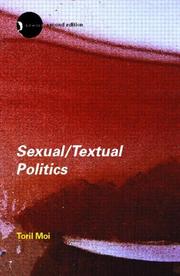
ISBN: 0415280117 0415280125 Year: 2002 Volume: *9 Publisher: London Routledge
Abstract | Keywords | Export | Availability | Bookmark
 Loading...
Loading...Choose an application
- Reference Manager
- EndNote
- RefWorks (Direct export to RefWorks)
Critique littéraire féministe --- Feminist literary criticism --- Feministische literatuurkritiek --- 82:396 --- Literatuur en feminisme --- 82:396 Literatuur en feminisme --- Feminism and literature --- Literature --- Women and literature --- Belles-lettres --- Western literature (Western countries) --- World literature --- Philology --- Authors --- Authorship --- Literary criticism, Feminist --- Feminist criticism --- History and criticism&delete& --- Theory, etc --- Women authors --- History and criticism --- Literature History and criticism --- Theory, etc. --- Literature and feminism
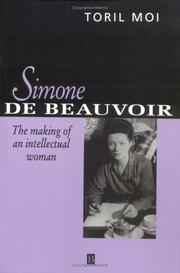
ISBN: 0631146733 063119181X Year: 1994 Publisher: Oxford Blackwell
Abstract | Keywords | Export | Availability | Bookmark
 Loading...
Loading...Choose an application
- Reference Manager
- EndNote
- RefWorks (Direct export to RefWorks)
Women and literature --- Women authors, French --- Women intellectuals --- Philosophy, French --- Femmes et littérature --- Ecrivaines françaises --- Intellectuelles --- Philosophie française --- History --- Biography --- Histoire --- 20e siècle --- Biographie --- Beauvoir, Simone de, --- France --- Intellectual life --- Vie intellectuelle --- Femmes et littérature --- Ecrivaines françaises --- Philosophie française --- 20e siècle --- Intellectuals --- Beauvoir, S. de --- De Beauvoir, Simone, --- Bofuwa, Ximengna de, --- Bōvōwāru, Shimōnu do, --- Bovuar, Simona de, --- Būfwār, Sīmūn Dū, --- De Bofuwa, Ximengna, --- Po-wa, Hsi-meng, --- Castor, --- de Beauvoir, Simone, --- de Beauvoir, Simone --- Beauvoir, Simone de --- De Beauvoir, Simone --- Bofuwa, Ximengna de --- Bōvōwāru, Shimōnu do --- Bovuar, Simona de --- Būfwār, Sīmūn Dū --- De Bofuwa, Ximengna --- Po-wa, Hsi-meng --- Castor
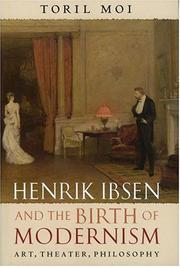
ISBN: 0199295875 9780199295876 Year: 2006 Publisher: Oxford Oxford university press
Abstract | Keywords | Export | Availability | Bookmark
 Loading...
Loading...Choose an application
- Reference Manager
- EndNote
- RefWorks (Direct export to RefWorks)
Henrik Ibsen (1828-1906) is the founder of modern theater, and his plays are performed all over the world. Yet in spite of his unquestioned status as a classic of the stage, Ibsen is often dismissed as a boring old realist, whose plays are of interest only because they remain the gateway to modern theater. In Henrik Ibsen and the Birth of Modernism, Toril Moi makes a powerful case not just for Ibsen's modernity, but also for his modernism. Henrik Ibsen and the Birth of Modernism situates Ibsen in his cultural context, emphasizes his position as a Norwegian in European culture, and shows how important painting and other visual arts were for his aesthetic education. The book rewrites literary history, reminding modern readers that idealism was the dominant aesthetic paradigm of the nineteenth century. Modernism was born in the ruins of idealism, Moi argues, thus challenging traditional theories of the opposition between realism and modernism. By reading Ibsen's modernist plays as investigations of the fate of love in an age of skepticism, Moi shows why Ibsen still matters to us. In this book, Ibsen's plays are showed to be profoundly concerned by theater and theatricality, both on stage and in everyday life. Ibsen's unsettling explorations of women, men and marriage here emerge as chronicles of the tension between skepticism and the everyday, and between critique and utopia in modernity. This radical new account places Ibsen in his rightful place alongside Baudelaire, Flaubert and Manet as a founder of European modernism.
Modernism (Literature) --- Ibsen, Henrik, --- Criticism and interpretation. --- Modernism (Literature). --- Crepuscolarismo --- Literary movements --- Postmodernism (Literature) --- イプセン, ヘンリック
Book
ISBN: 022646444X 9780226464442 9780226464305 9780226464589 Year: 2017 Publisher: Chicago, Ill. The University of Chicago Press
Abstract | Keywords | Export | Availability | Bookmark
 Loading...
Loading...Choose an application
- Reference Manager
- EndNote
- RefWorks (Direct export to RefWorks)
This radically original book argues for the power of ordinary language philosophy - a tradition inaugurated by Ludwig Wittgenstein and J. L. Austin, and extended by Stanley Cavell - to transform literary studies. In engaging and lucid prose, Toril Moi demonstrates this philosophy's unique ability to lay bare the connections between words and the world, dispel the notion of literature as a monolithic concept, and teach readers how to learn from a literary text. Moi first introduces Wittgenstein's vision of language and theory, which refuses to reduce language to a matter of naming or representation, considers theory's desire for generality doomed to failure, and brings out the philosophical power of the particular case. Contrasting ordinary language philosophy with dominant strands of Saussurean and post-Saussurean thought, she highlights the former's originality, critical power, and potential for creative use. Finally, she challenges the belief that good critics always read below the surface, proposing instead an innovative view of texts as expression and action, and of reading as an act of acknowledgment. Intervening in cutting-edge debates while bringing Wittgenstein, Austin, and Cavell to new readers, 'Revolution of the Ordinary' will appeal beyond literary studies to anyone looking for a philosophically serious account of why words matter.
Book
ISBN: 0631149724 0631149732 Year: 1987 Publisher: Oxford Blackwell
Abstract | Keywords | Export | Availability | Bookmark
 Loading...
Loading...Choose an application
- Reference Manager
- EndNote
- RefWorks (Direct export to RefWorks)
Fonds Suzan Daniel (FSD)
Feminism --- -#SBIB:316.346H10 --- #SBIB:1H30 --- Emancipation of women --- Feminist movement --- Women --- Women's lib --- Women's liberation --- Women's liberation movement --- Women's movement --- Social movements --- Anti-feminism --- Vrouwenproblematiek, feminisme: algemeen --- Filosofie van de mens, wijsgerige antropologie --- Emancipation --- #SBIB:316.346H10 --- 82:396 --- 82:396 Literatuur en feminisme --- Literatuur en feminisme
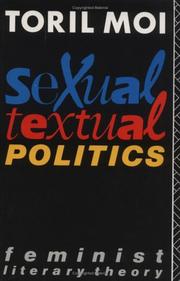
ISBN: 0415029740 Year: 1988 Publisher: London Routledge
Abstract | Keywords | Export | Availability | Bookmark
 Loading...
Loading...Choose an application
- Reference Manager
- EndNote
- RefWorks (Direct export to RefWorks)
82:396 --- Feminist literary criticism --- Feminism and literature --- Literature --- -Women and literature --- Belles-lettres --- Western literature (Western countries) --- World literature --- Philology --- Authors --- Authorship --- Literary criticism, Feminist --- Feminist criticism --- 82:396 Literatuur en feminisme --- Literatuur en feminisme --- History and criticism --- -Theory, etc --- Women authors --- Women and literature --- History and criticism&delete& --- Theory, etc --- Feminist literary criticism. --- Feminism and literature. --- Women and literature. --- Theory, etc. --- Literature History and criticism --- Literature and feminism
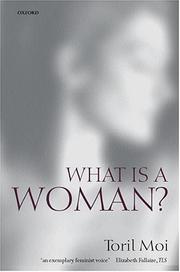
ISBN: 0198186754 9780198186755 Year: 2008 Publisher: Oxford Oxford University Press
Abstract | Keywords | Export | Availability | Bookmark
 Loading...
Loading...Choose an application
- Reference Manager
- EndNote
- RefWorks (Direct export to RefWorks)
What is a woman? And what does it mean to be a feminist today? In her first full-scale engagement with feminist theory since her internationally renowned Sexual/Textual Politics (1985), Toril Moi challenges the dominant trends in contemporary feminist and cultural thought, arguing for a feminism of freedom inspired by Simone de Beauvoir's The Second Sex. Written in a clear and engaging style What is a Woman? brings together two brand new book-length theoretical interventions, Moi's work on Freud and Bourdieu, and her studies of desire and knowledge in literature. In the controversial title-essay, Toril Moi radically rethinks current debates about sex, gender, and the body - challenging the commonly held belief that the sex/gender distinction is fundamental to all feminist theory. Moi rejects every attempt to define masculinity and femininity, including efforts to define femininity as that which 'cannot be defined'. In the second new book-length essay, 'I Am a Woman', Toril Moi reworks the relationship between the personal and the philosophical, pursuing ways to write theory that do not neglect the claims of the personal. Setting up an encounter between contemporary theory and Simone de Beauvoir, Moi radically rethinks the need, and difficulty, of finding one's own philosophical voice by placing it in new theoretical contexts. A sustained refusal to lay down theoretical or political requirements for femininity, and a powerful argument for a feminism of freedom, What is a Woman? is a deeply original contribution to feminist theory.
82:396 --- 396 --- 82:396 Literatuur en feminisme --- Literatuur en feminisme --- Feminisme. Vrouwenbeweging. Vrouw en maatschappij --- Feminist theory --- Women and literature --- Feminism and literature --- Political philosophy. Social philosophy --- Philosophical anthropology --- Depth psychology --- Sociology of the family. Sociology of sexuality --- Human physiology --- Sociology of literature --- Bourdieu, Pierre --- Girard, René --- Freud, Sigmund
Book
ISBN: 0199202591 9780199202591 Year: 2008 Publisher: Oxford: Oxford university press,
Abstract | Keywords | Export | Availability | Bookmark
 Loading...
Loading...Choose an application
- Reference Manager
- EndNote
- RefWorks (Direct export to RefWorks)
Henrik Ibsen (1828-1906) is the founder of modern theater, and his plays are performed all over the world. Yet in spite of his unquestioned status as a classic of the stage, Ibsen is often dismissed as a fuddy-duddy old realist, whose plays are of interest only because they remain the gateway to modern theater. In Henrik Ibsen and the Birth of Modernism , Toril Moi makes a powerful case not just for Ibsen's modernity, but for his modernism. Situating Ibsen in his cultural context, she shows how unexpected his rise to world fame was, and the extent of his influence on writers such Shaw, Wilde, and Joyce who were seeking to escape the shackles of Victorianism. Henrik Ibsen and the Birth of Modernism also rewrites nineteenth-century literary history; positioning Ibsen between visual art and philosophy, the book offers a critique of traditional theories of the opposition between realism and modernism. Modernism, Moi argues, arose from the ruins of idealism, the dominant aesthetic paradigm of the nineteenth century. She also shows why Ibsen still matters to us today, by focusing on two major themes-his explorations of women, men, and marriage and his clear-eyed chronicling of the tension between skepticism and the everyday. This radical new account places Ibsen in his rightful place alongside Baudelaire, Flaubert, and Manet as a founder of European modernism.
| Listing 1 - 10 of 26 | << page >> |
Sort by
|

 Search
Search Feedback
Feedback About UniCat
About UniCat  Help
Help News
News